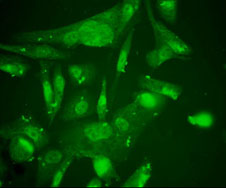Mar 12 2010
Northeastern University pharmaceutical sciences professor Mansoor Amiji is leading interdisciplinary research into nanotechnology-based methods of drug delivery that could provide breakthroughs in treating diseases such as cancer, Alzheimer's, schizophrenia and HIV/AIDS.
 Using nanotechnology, Amiji will work to deliver drugs inside cancer cells, like the Ovarian cancer cells pictured here. Courtesy photo from Mansoor Amiji.
Using nanotechnology, Amiji will work to deliver drugs inside cancer cells, like the Ovarian cancer cells pictured here. Courtesy photo from Mansoor Amiji.
The National Institutes of Health (NIH) recently awarded so-called R21 grants to back the work of Amiji and his collaborators from the Colleges of Arts and Sciences and Engineering. The NIH's R21 program encourages novel and high-risk/high-reward research by providing support for the early and conceptual stages of project development.
The National Cancer Institute awarded a two-year, $350,000 grant to develop more potent therapies for killing cancer cells that become resistant after initial chemotherapeutic treatment, which can cause relapse in patients with different types of cancer.
Amiji, working with chemistry and chemical biology professors Robert Hanson and Max Diem, will explore whether including the cell killer ceramide as a part of chemotherapy will kill tumor cells that are resistant to other treatment approaches.
Using nanocarrier technology, the combination treatment would be delivered directly to a cancer cell's mitochondria to trigger cell death.
The National Institute of Neurological Diseases and Stroke awarded a two-year, $475,000 grant to Amiji and chemical engineering professor Rebecca Carrier to examine a "nano-emulsion" system of delivery that will allow drugs to cross the blood-brain barrier.
The process could greatly increase the recovery chances of a patient with Parkinson's or HIV/AIDS, Amiji said, because "having a system to get these drug therapies to their appropriate place of action is critical."
Current drugs developed for treating brain diseases can't reach the brain 98 percent of the time because of the low permeability of the blood-brain barrier. Researchers are investigating whether a nano-sized mixture of water, oil droplets rich in omega-3 fatty acids and curcumin, an Indian spice, will help drugs cross the blood-brain barrier by increasing its permeability.
The new system could vastly improve the treatment of those diseases that tend to "hide" in the brain, using it as a sanctuary.
"If we can take the drug to where the virus is hiding, we will have better therapeutic effects," said Amiji.